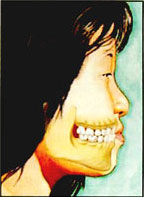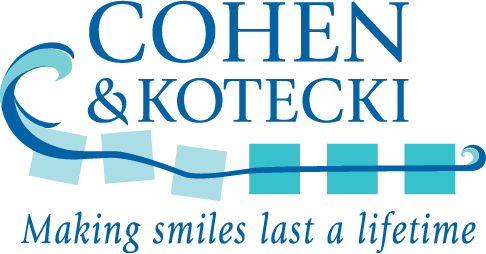Early Orthodontics
Did you know that some children are excellent candidates for orthodontic treatment, even though they may still have some “baby teeth.”
Orthodontics has always been an excellent solution for children and adults. For many Philadelphia area parents, they can be happy knowing many options are available. If you’re a parent with a genetic history of orthodontic issues, your child could be at risk themselves. However, this can be addressed accordingly through early orthodontics.
Dr. Cohen and Dr. Kotecki both know that orthodontic issues can affect a child’s smile greatly. They also know that the earlier these are addressed, the better.
You may be wondering, “Is my child too young to see an orthodontist?”
It is beneficial for you to have your child evaluated by an orthodontist by age seven to assess any problems that may be developing.
Early orthodontics explained
Early orthodontics pertains to treatment in children who range from ages 7 through 11. If you have children around this age, it is important that you make sure they see a pediatric dentist. They specialize in children’s dental health and will be able to spot issues where pediatric orthodontists in Philadelphia will be useful. If you have children younger than 7 and have concerns about orthodontic issues, it’s important to plan ahead.
At age 7, children may have some of their permanent teeth already in place or may be erupting. The eruption could set the state for possible orthodontic issues including crowding, overbites, crossbites, or related issues. Addressing possible orthodontic issues as early as possible can make things easier regarding a child’s overall dental health.
These issues will be corrected accordingly. Your child will smile more confidently and know that their teeth are straight and looking their best.
What are the best solutions for early orthodontics?
One of the best solutions for early orthodontics may be child braces in Philadelphia. However, it may be dependent upon the severity of the situation. Another option may include Invisalign for kids, which may be a good fit for those in the age range between 7 and 11. As a parent, be sure to consider your options carefully.
A children’s orthodontist in Philadelphia will be able to examine your child first before presenting them. They will make recommendations regarding early orthodontist treatment.
What are the benefits of early orthodontic treatment?
Visiting a pediatric orthodontist for children’s braces in Philadelphia carries plenty of benefits. They include but are not limited to the following:
Improved oral health
Those with straight teeth will have an easier time taking care of them. If they consistently follow an oral health care plan (brush twice and floss once daily), it will reduce the risk of oral health issues in the future.
A boost in confidence
Yes, a healthy smile can make one confident. Especially kids when they grow into teens and later adults. They can smile more and feel good about themselves.
Promote proper overall growth
Of course, a child’s adult teeth will continue to come in throughout their childhood. And it will also help with overall jaw growth as they get older as well. Having a pediatric orthodontist tackle the issues early will make this more than possible.
Prevents future complications
Common issues such as impacted teeth and misalignment of the jaw will be prevented with pediatric braces in Philadelphia or a similar solution. Such issues may be difficult to correct later on in life.
Additional benefits of early treatment
- Create a more stable long-term result, especially with severe bite problems
- Shortening or improving the results of the second phase of treatment
- Allowing for treatment at an age when some children are more cooperative
- Helping prevent fractures to teeth that “stick out”
- Attempting to minimize future jaw surgery
- Lessen the chance of permanent tooth removal
What are the signs of early orthodontics issues?
As mentioned, genetics could play a role. However, if this isn’t the case, some orthodontic issues may still be possible. That’s why you may need to be on the lookout for any possible signs. They include but are not limited to the following:
- Difficulties in chewing or biting
- Loss of baby teeth at either an earlier or much later age
- Thumb sucking (if child is older than 5)
- Upper and lower teeth are not meeting properly
- Grinding or clenching teeth
- Teeth that are crowded, blocked out, or misplaced by age 7 or 8
These are some of the most common signs to look out for. A pediatric dentist in Philadelphia may also spot other signs that may be less noticeable. If they discover this, they will refer you to a kids orthodontist in Philadelphia that will be able to correct the issue accordingly. Schedule an appointment with a pediatric dentist first before an orthodontic referral can be made.
When is early treatment is needed?
These are some of the signs that early treatment may be necessary due to jaw or muscle problems.
- An unbalance profile
- An overbite, underbite, crossbite, gummy smile, deep bite, or open bite
- Overlapping or crowded teeth
- Difficulty chewing
- Open-mouth breathing
- Speech problems
- Tongue-thrusting (pushing the tongue against teeth while swallowing)
- Thumb or finger-sucking after the age of 4
- Jaw joint problems

A Large Upper Jaw or a Small Lower Jaw
In many children, the upper jaw is large or too far forward, or the lower jaw is small or too far back. This is called an overbite (upper protrusion or lower retrusion).

A Small Upper Jaw or a Large Lower Jaw
An upper jaw that’s too small is too far back or lower jaw that’s too large too far forward. This creates an underbite (upper retrusion or lower protrusion).

Short Arch or Narrow Palate
If the arch is not long enough, crowing of teeth may result. Or, if the palate isn’t wide enough, the upper teeth may fit inside the lower teeth (a crossbite).

Long Upper Jaw
An upper jaw that has excess vertical height may create a gummy smile. The opposite problem may also occur. If the upper jaw is too short vertically, teeth overlap, creating a deep bite.

Muscle Problems
The tongue is very strong that can move teeth if it pushes against them, especially during swallowing. Thumb or finger-sucking can have the same effect, creating an open bite (the teeth don’t meet)
Schedule a Free Consult
Philadelphia parents who have concerns about early orthodontics can consult with South Philadelphia Orthodontic Associates – even at the recommendation of your child’s pediatric dentist. For more information on how we can help or if you need to set an appointment, call our office today at 215-271-8870.












